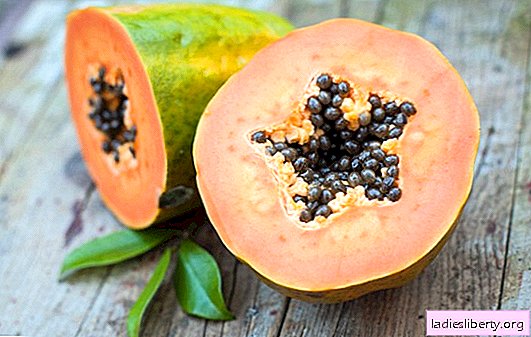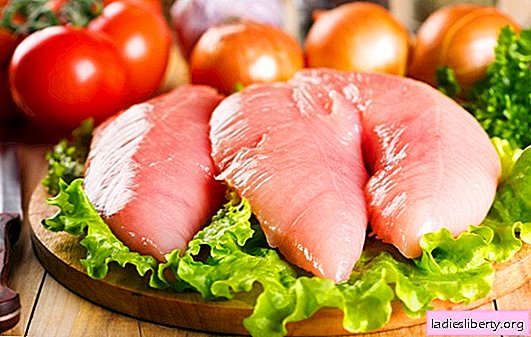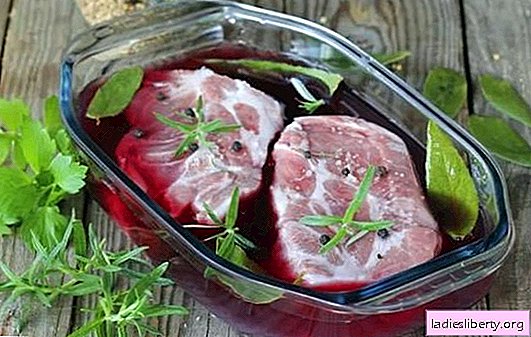
The abundance and variety of tropical fruits never ceases to amaze us. Bright unique tastes and aromas, rich nutritional composition, unique combination of trace elements and vitamins inevitably attract attention. Papaya is no exception - an amazing fruit, the benefits of which can be discussed for a very long time.
Papaya fruits have a number of interesting properties that are very useful for people and widely used. This fruit is ideal for diet food, but sometimes papaya can harm the body.
Description of papaya and its composition
This fruit grows on palm-like trees. When baked on fire, the fruits exude the aroma of fresh bread, which is why the plant is sometimes called the bread tree. In shape, the papaya fruit resembles a pear, but the size of a melon. The ripe pulp is unusually juicy, fragrant, rather sweet. In section, the papaya looks like a melon with bright yellow-orange flesh and black round seeds inside.
INTERESTING! Papaya seeds are also very useful and have medicinal properties: they contribute to the removal of worms from the body. They are advised to take as seasoning for dishes instead of black pepper due to the sharp and bitter taste.
To taste, papaya can be described as a cross between pumpkin, melon, carrot and apricot. The vitamin and chemical composition of the fruit is more like a melon, but much richer.
Papaya is a powerful antioxidant due to the huge number of the most popular vitamins - antioxidants C, E and A:
• Vitamin C - strengthens the immune system, fights against viral and infectious diseases, cleanses about toxins, favorably affects the cardiovascular system, and prevents oncology; 100 g of pulp contains 103% of the daily value necessary for a person;
• Vitamin A and beta-carotene - strengthens vision, rejuvenates the skin, lungs, prevents cancer, prevents the deposition of kidney stones;
• Vitamin E - helps rejuvenate the body at the cellular level.
In addition, papaya is rich in B vitamins, plant-based antioxidants such as zeaxanthin, lutein, lycopene, as well as valuable useful trace elements - potassium, magnesium, calcium, phosphorus, iron, silicon, sodium, chlorine. But the most important thing is that fats and carbohydrates are practically absent in the exotic fruit - only 0.1% and 8%, respectively, but they contain in excess:
• valuable enzymes - papain, arginine, karpain (about their benefits - below);
• structured water - 88.5%;
• plant fibers (fiber) - 2.5%;
• proteins - 0.5%;
• ash - 0.6%.
The benefits of papaya for the body
The systematic use of this tropical fruit, at least for 1-2 months, will bring great benefits to the body.
Papain enzyme - the essence of papaya
Papaya contains the enzyme papain - a proteolytic enzyme (protease), in composition resembling gastric juice, which has the property of breaking down proteins, fats and starch. This ability facilitates the absorption and processing of protein foods of animal origin.
INTERESTING! In America, in order to reduce the heat treatment time of meat, it is pre-treated with papaya extract. The action of the enzyme is so powerful that in ancient times the inhabitants of South America simply wrapped raw meat in papaya leaves and after a few hours could eat it.
In medicine, papain is used to improve metabolism. The enzyme is part of the Lekozyme and Kareopazim preparations, which are used to treat intervertebral osteochondrosis, as it helps to restore connective tissue between the spinal discs.
Benefits for the heart, stomach
Papaya juice is useful for the gastrointestinal tract: daily use will help to avoid stomach cancer even for people with poor heredity (cancer of the stomach and colon), tone the stomach and intestines, cleanse the colon of toxins, mucus, pus. Papaya seeds along with pulp cleanse the body of parasites, destroying worms, giardia, intestinal amoeba and other species. 100 g of pulp contains 2.5 g of dietary plant fiber, which can bind and remove toxic carcinogens from the intestines, reducing the risk of cancer.
The high content of potassium and magnesium, as well as the enzyme carpain make papaya useful for the work of the heart and cardiovascular system. Karpain stabilizes the number of heart contractions and generally has a beneficial effect on the condition of the heart. The fibrin protein (one of the unique beneficial papaya proteins) is a fundamental component of the blood coagulation process.
Plant fiber helps lower bad cholesterol and prevents blood clots.
The pulp of the fetus has a pronounced alkaline reaction, so papaya is very useful for people suffering from gastritis, heartburn, and also enhances the production of insulin in type 1 diabetes.
INTERESTING! Native Americans where papaya grows use flesh as soap because of its strong alkaline properties.
The arginine enzyme is very important for the reproductive functions of the male body.
For eye health
There is so much vitamin A and provitamin - beta-carotene in papaya that the fruit is much more effective for vision than the recognized "leader" - carrots.
Tropical "melon" prevents vision loss, aging and macular (age-related) degeneration of the fiber of the eye.
The benefits of papaya for the female body
The unique composition of vitamins, enzymes, vital minerals at a very low calorie content - only 57 kcal per 100 g of product - makes papaya a universal dietary product. If you eat at least one fruit a week, you can quickly feel the beneficial effects on the body:
• iron will help to cope with the pain of PMS;
• surge of energy, vitality, the ability to restore strength and sleep in a short period of time;
• prevention of depression (or rapid recovery and relief from depression);
• the skin becomes smooth and supple.
The soft peel of the fruit and the aromatic flesh can be used to prepare anti-aging face masks at home, as they have the ability to heal wounds, tone and rejuvenate the skin.
During pregnancy and breastfeeding, papaya will fully provide the body with folic acid (B9), which is very useful for preventing fetal anemia, normal development of the baby’s nervous system, and preventing various birth defects.
Papaya Harm
Unfortunately, there is an opinion that the enzyme papain is harmful during pregnancy.
In addition, papaya, like many other tropical fruits, contains latex - a strong allergen, therefore it can provoke an allergic reaction.
Unripe fruits contain toxic substances that can cause poisoning and indigestion.
Some useful tips
Papaya is useful only in ripe form, and unripe fruits must be cooked before consumption.
The ripe fruit is a little soft when pressed, smooth, has ruddy spots on the green field. Fruit can be stored for no more than a week, and for long-term storage, the pulp can be dried in the oven at a temperature of about 60 ° C - all useful properties will be preserved!











